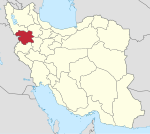Pir Shalyar
The festival of Pir Shalyar (also spelled as Shaliyar) is an old traditional ceremony in Kurdistan. It is held in the 40th day of winter. The celebration is held in three stages, each in a day of three consecutive weeks.
Pir Shaliyar[]
Pir (saint/magi) Shaliyar (vizier), i.e Pir Shaliyar is believed to have cured a Bukharan princess and married her; the ceremony marks their marriage.[1] It's also Believed to be the ‘oldest’ Literary text in Kurdish before the Islamization of Kurdistan.[2]
Celebration[]
In the first week children inform the people of the coming of the ceremony with distribution of walnuts to every home.[3]
In the second week, at the Wednesday night before sunrise, children go up to the roofs of homes, singing the traditional Kurdish songs. Shortly after sunrise cows and sheep are sacrificed. In the evening they play Daf and pray repeating spiritual hymns.[3]
In the third Friday of the month Rebendan (second month of winter in Kurdish calendar), golden breads made of wheat and walnut in the shape of the sun (disc) are brought to the tomb of Pir to be distributed among participants and eaten.[3]
References[]
- ^ UNESCO (2020-10-08). Youth Lens on the Silk Roads: Best photos from the International Silk Roads Photo Contest. UNESCO Publishing. ISBN 978-92-3-100406-3.
- ^ Tove Skutnabb-Kangas, Sertar Bucak, Killing a mother tongue: how the kurds are deprived of linguistic human rights.[1] Linguistic Human Rights, 1994, p. 350: “Most Kurdish literary critics consider Kurdish art poetry to have started with Baba Tahir Hamadani (935-1010) (Shakely 1989: 51), but the oldest Kurdish literary text, Pir Salyar's wisdom, dates from the period before the Islamization of Kurdistan. Orature (Oral literature) has always played an important part in the development of the Kurdish language, partly because of the oppression of Kurdish literature.”
- ^ a b c "PUKmedia Patriotic Union of Kurdistan". www.pukmedia.com. Retrieved 2021-05-06.
External links[]
- Kurdish culture
- Kurdistan stubs
- Middle East mythology stubs
